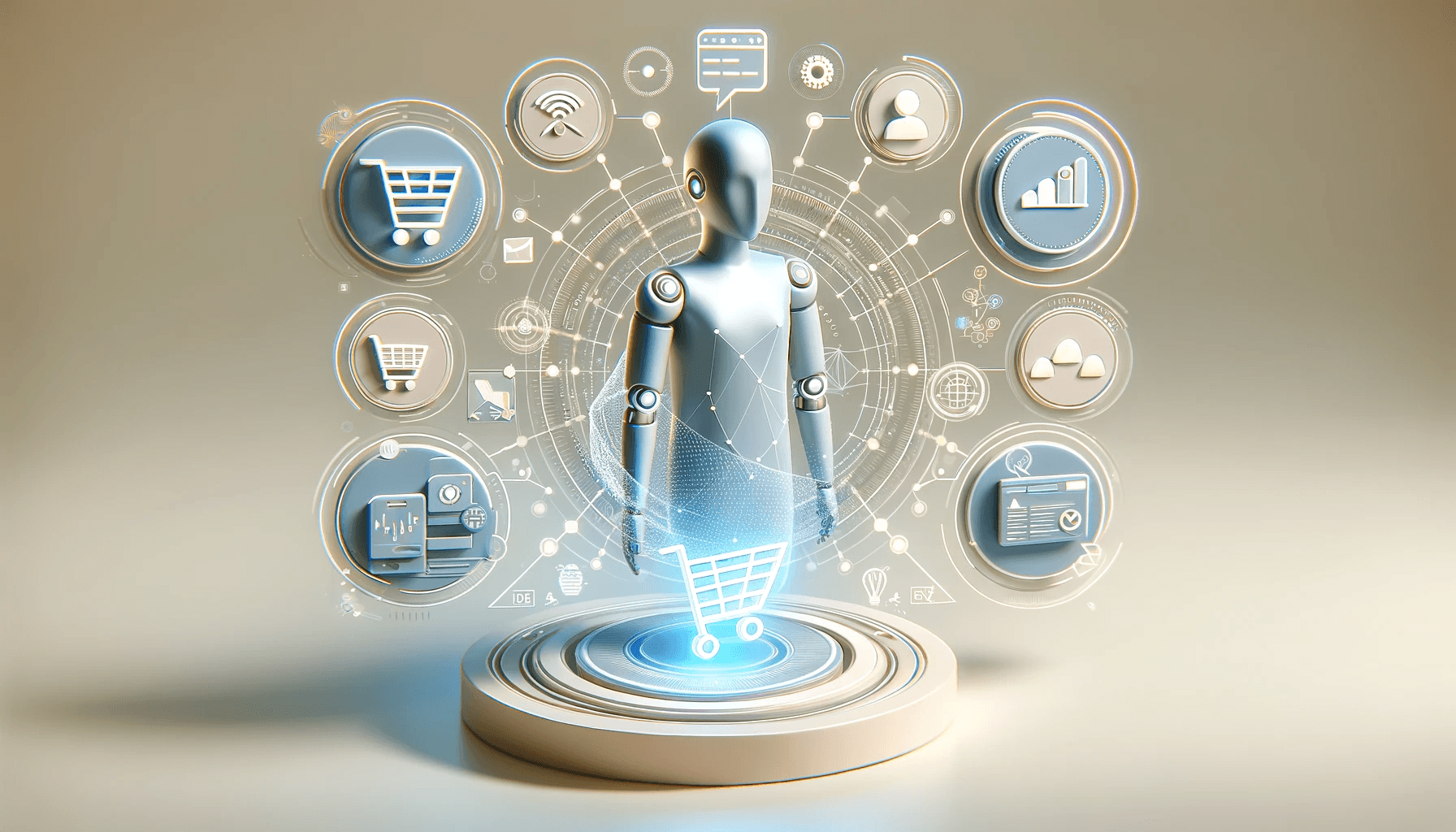Support center +91 97257 89197
E-commerce DevelopmentJanuary 2, 2024
E-commerce Personalization: Leveraging Al for Enhanced Customer Experiences

Introduction
In the fast-paced world of e-commerce, personalization has become a cornerstone for success. With an ever-growing pool of competitors and increasingly discerning customers, businesses are turning to artificial intelligence (AI) to create unique, engaging, and efficient shopping experiences. E-commerce personalization is no longer a luxury but a necessity for those looking to thrive in the digital marketplace.
The Rise of AI in E-commerce
The integration of AI in e-commerce marks a significant shift from a one-size-fits-all approach to a more nuanced, customer-centric model. This transition has been fueled by advancements in AI technology and data analytics. In the early days, personalization was rudimentary, often limited to basic product recommendations based on purchase history. Today, AI algorithms analyze vast amounts of data, including browsing behaviors, purchase patterns, and social media interactions, to deliver highly personalized shopping experiences.
Current trends in AI-driven e-commerce are impressive. According to recent statistics, over 80% of customers are more likely to purchase from a brand that offers personalized experiences. Furthermore, retailers using AI for personalization have seen sales increase by up to 15%.
Key Components of AI-driven E-commerce Personalization
-
Data Collection and Analysis: At the core of AI personalization is data. AI systems gather and analyze data from various sources to understand customer preferences and behaviors.
-
Personalized Recommendations: Using predictive analytics, AI suggests products that a customer is likely to be interested in, based on their past interactions and preferences.
-
Predictive Search: AI enhances search functionality by predicting what customers are looking for, even with limited input, and providing relevant results.
-
AI-powered Chatbots: These virtual assistants provide personalized customer service, offering product recommendations and support based on individual customer needs.
-
Dynamic Pricing: AI algorithms adjust prices in real-time based on demand, competition, and customer profile, optimizing both sales and customer satisfaction.
Benefits of E-commerce Personalization for Businesses
The advantages of implementing AI in e-commerce personalization are manifold. Firstly, businesses experience increased sales and conversion rates as customers find what they need more quickly and efficiently. Personalization also fosters customer loyalty and retention, as shoppers feel understood and valued. Moreover, AI-driven personalization significantly enhances the overall user experience, making shopping more intuitive and enjoyable. Lastly, businesses gain a competitive advantage by staying ahead of the curve in adopting these advanced technologies.
The realm of AI in e-commerce personalization is poised to witness exponential growth, driven by emerging technologies and innovative approaches. As we venture further into the digital age, the following trends and predictions are likely to shape the future of this dynamic field:
-
Integration of Augmented Reality (AR) and Virtual Reality (VR): AR and VR technologies are set to transform the online shopping experience by allowing customers to virtually try on clothes or preview products in their own space, enhancing the personalization aspect and reducing return rates.
-
Voice-Assisted Shopping: With the rise of smart speakers and voice assistants, voice commerce is becoming increasingly prevalent. AI will personalize this experience by recognizing individual voice patterns and shopping preferences, making recommendations more precise and shopping more convenient.
-
Advanced Predictive Analytics: Future AI systems will offer even more sophisticated predictive analytics, foreseeing customer needs and preferences with greater accuracy. This will not only enhance the personalization of product recommendations but also optimize inventory management and supply chain processes.
-
Emotion Detection and Sentiment Analysis: AI technologies will evolve to interpret customer emotions and sentiments through their online behaviors and interactions. This capability will enable businesses to tailor experiences more empathetically and effectively.
-
Blockchain for Enhanced Security and Transparency: As data security remains a critical concern, blockchain technology will play a significant role in securing customer data and enhancing trust in AI-driven personalization strategies.
-
Personalized Marketing Automation: AI will enable more nuanced and effective marketing automation, sending personalized messages and offers at the optimal time and through the preferred channels of individual customers, thereby increasing engagement and conversion rates.
-
AI Ethics and Responsible AI: As AI becomes more integral to e-commerce, there will be a stronger focus on ethical AI practices. This includes ensuring fairness, transparency, and accountability in AI algorithms to avoid biases and maintain customer trust.

Challenges and Considerations
While the benefits are substantial, there are challenges to consider. Privacy and data security are paramount; businesses must ensure they are handling customer data responsibly. Balancing personalization and intrusiveness is another delicate issue. Customers appreciate relevant recommendations but can be put off by overly intrusive or aggressive marketing. Additionally, implementing AI-driven personalization requires technical expertise and can be resource-intensive.
Case Studies
Several e-commerce giants have successfully integrated AI into their platforms, resulting in remarkable improvements in customer satisfaction and sales. For example, a well-known online retailer used AI to provide personalized product recommendations, leading to a 35% increase in sales. Another case study involves a fashion retailer that implemented AI for predictive search and size recommendations, resulting in a 50% reduction in returns.
Future of AI in E-commerce Personalization
The future of AI in e-commerce personalization is bright and full of possibilities. Emerging technologies like augmented reality (AR) for virtual try-ons and voice recognition for hands-free shopping are set to further revolutionize the e-commerce experience. Experts predict a more seamless integration of AI, providing even more personalized and intuitive shopping journeys.
Conclusion
E-commerce personalization, powered by AI, is an indispensable tool in the modern digital marketplace. By understanding and implementing AI-driven strategies, businesses can significantly enhance customer experiences, leading to increased sales and sustained growth.
TLDR
This blog explores how AI-driven personalization is revolutionizing e-commerce, offering businesses a way to enhance customer experiences through personalized recommendations, predictive search, and automated customer service. We delve into the benefits, challenges, and future trends of AI in e-commerce, providing insights for businesses looking to stay ahead in the digital marketplace.
FAQs
E-commerce personalization involves using data and AI to tailor the shopping experience to individual customers, including product recommendations, personalized search results, and targeted marketing.
AI enhances customer experiences by analyzing data to predict customer preferences, offering relevant product suggestions, and providing efficient customer service through chatbots and automated support.
Benefits include increased sales, higher customer retention, personalized user experiences, and gaining a competitive edge in the market.
Challenges include ensuring customer data privacy, avoiding overly intrusive personalization, and managing technical and resource requirements.
The future includes the integration of emerging technologies like augmented reality and voice recognition, leading to even more sophisticated and seamless personalized shopping experiences.
Work with us







